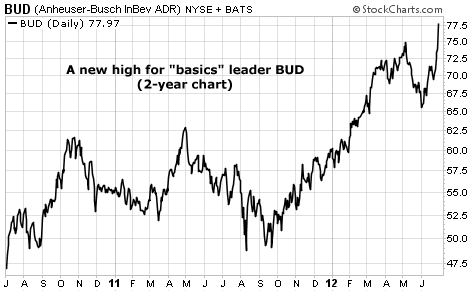| Home | About Us | Resources | Archive | Free Reports | Market Window |
Here's the Answer: GERMANY, Not Greece, Should Exit the EuroBy
Monday, July 2, 2012
German taxpayers shouldn't bail out their neighbors...
Instead, Germany should consider leaving the euro.
Over the weekend, Germany's neighbors convinced Germany to sign on for even more help. The Europeans agreed on having a pan-European Banking Union. The idea is that all of Europe would bail out European banks when necessary. The reality is, Germany will be the one saving the others.
Instead of being forced into that position, Germany should consider stepping out of the euro itself.
It comes down to who is actually in the euro. Based on the size of their economies, Germany, France, and the five "PIIGS" nations (Portugal, Italy, Ireland, Greece, and Spain) make up over 80% of the euro.
All of these countries are in trouble, except Germany.
You already know about Greece and the other PIIGS... but France will soon be in trouble, too...
You see, France has a new President, François Hollande. Mr. Hollande was a key figure over the weekend in forcing Germany to help the weaker countries. Take a look at Mr. Hollande's plans (according to The Economist):
The thing is, if Mr. Hollande follows through with these plans, France could be a bigger mess than Greece and the rest of the PIIGS in no time... Heck, with French public debt at 90% of the country's GDP, it won't take long for France to catch up with the PIIGS.
So the big question is, why should German taxpayers work hard and eventually pay to bail out guys with plans like Mr. Hollande's? They shouldn't...
Again, as measured by the size of their economies, these seven countries make up over 80% of the euro. Only one of these countries – Germany – has its act together. It appears that the other countries are incapable of making the necessary changes.
So why should we prolong Europe's euro crisis indefinitely?
The answer to the problem is relatively simple: Germany, not Greece, should exit the euro...
I wish I had a nifty trade for you on all of this mess... like buying German government bonds, for example. But unfortunately, the land mines are too big whichever way you turn. (If you bought German government bonds denominated in euros, for example, and Germany left the euro, would those bonds stay in euros? I don't know.)
For a good summary of what could happen if Germany left the euro, check out this article, co-authored by a hedge fund manager and a University of Chicago professor.
In sum, the quickest, simplest solution for Europe is right under their noses... It's for Germany, not Greece, to leave the euro.
Good investing,
Steve
Further Reading:
Growth Stock Wire's Jeff Clark has a "tongue in cheek" take on Germany's bailouts. Find his essays here:
Market NotesA "BASICS" DOMINATOR HITS A NEW HIGH Today's chart shows the "basics" approach to investing is paying off...
Regular readers know that when it comes to investing in high-growth emerging markets like Brazil, India, and China, we're drawn to "the basics" approach of owning dominant global companies that sell things like soda, razor blades, beer, and cigarettes to these markets. "Boring" products like these enjoy steady demand... and there's scant risk that technology will make having a beer after work obsolete. Plus, well-run companies in these industries generate huge cash flows and big dividends.
One company that exemplifies the "basics" approach is a favorite of our colleague Dan Ferris: global beer giant Anheuser-Busch InBev (NYSE: BUD). The firm is a member of Dan's elite "World Dominator" group of companies that enjoys advantages over competitors, stable cash flows, and offer shareholders a "worry free" way to safely compound wealth in the stock market.
As you can see from the chart below, the market agrees with Dan's thesis. BUD climbed nearly 8% on Friday on news that it will buy Grupo Modelo (which makes Corona and other brands)... It just struck a new 52-week high. We state again: Selling the "basics" like beer, cigarettes, and soda isn't pretty. It just works.
– Brian Hunt
 |
In The Daily Crux
Recent Articles
|


